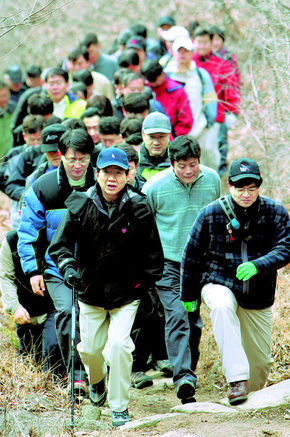 |
|
President Roh Moo-hyun takes a hike on a mountain behind the presidential office, followed by a group of reporters.
|
Says it will remain separate from U.S., Japanese hard-liners
The presidential office clarified that it would have its own voice - in contrast to U.S. and Japanese hard-liners rallying against North Korea - despite harsh criticism of conservative media and political forces. In an article titled, "What creates uneasiness?," the presidential office for public information wrote, "It is not important to be pro-Pyongyang or pro-Washington, but [what is important is] peace on the Korean Peninsula. What makes us uneasy is an environment which urges South-North confrontation. After the disappearance of dictatorial regimes which used [national] security for political gain, several newspapers have attacked the government [for not taking] a hard-line position against the North. If they expand this confrontational environment, driving Pyongyang to the edge of a cliff, peace will finally be destroyed." According to the presidential office’s article, "Some newspapers overstated the President’s remarks at Cabinet meetings, as if the government instigates conflicts with Washington. The U.S. is our partner, but that doesn’t mean that the two partners are one. Moreover, it never means blind obedience."Regarding the partnership between Seoul and Washington, the office said that the two "should advance together, adjusting differences while maintaining a balance between cooperation and raising objections." The remarks come out of a background in which Washington initially agreed to solve the North’s missile problem while not worsening it, but later adopted a more hard-line position against the North, along the lines of Tokyo’s get-tough policies. A key security official at the presidential office, asking to remain anonymous, said that "Song Min-soon, the president’s chief aide for national security, and Condoleezza Rice, the U.S. secretary of state, agreed that the two nations would jointly resolve the missile crisis through political discussions during an appropriate time frame. But when Japan presented a firm U.N. resolution, including reference to Chapter VII of the U.N. Charter that enables military enforcement, the U.S. began to use this strategically." Another official, also asking to remain unnamed, explained, "If we accept the U.S.-led Proliferation Security Initiative (PSI) and search North Korean ships, war could take place immediately. We needed to clarify to the U.S. that we can never accept this." His comments referred to President Roh’s remarks on July 11 criticizing the U.S. hard-line approach against the North, as well as his speech at a Cabinet meeting on July 25, in which he responded to criticism of Blue House foreign policy by asking whether Washington was free from making mistakes.






